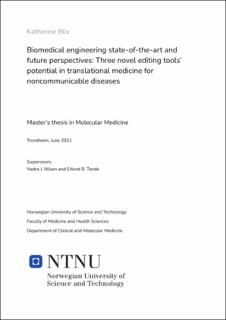| dc.description.abstract | Biomedical engineering has seen great progress since the development of new gene-editing and RNA-editing technologies. At the moment, there are numerous ongoing biomedical research that utilize new technologies for editing DNA or RNA.
This thesis aims to investigate the potential of three novel biomedical engineering editing tools (namely CRISPR/Cas9, prime editing, and programmed RNA-editing) in translational medicine for noncommunicable diseases. Different studies have been taken into consideration, and independently examined based on in vivo (or similar tests, i.e. tests done on organoids) and preclinical trial studies. Moreover, the most recent knowledge on chronic inflammation is given as a basis to understand noncommunicable diseases. In addition, future perspectives on the use of these editing tools in basic biomedical research for these diseases are discussed. An experiment model is also presented as an example of designing CRISPR/Cas9 gene target guides for knockout of the scavenger receptor CD36 to study atherosclerosis.
The results gathered from the literature review on the three novel editing tools have highlighted the lack of knowledge that there still is on prime editing and programmed RNA-editing tools, and the need to further investigate their potential in translational medicine. Overall, this thesis highlights how each of the tools taken into consideration hold its own unique potential in translational medicine, if used for studying or treating different specific diseases. Therefore, since all three biomedical engineering editing tools mentioned herein seem to have all great potential in transcriptional medicine, they should not be seen as a good or worse alternative to each other, but rather different solutions for different diseases. | |
